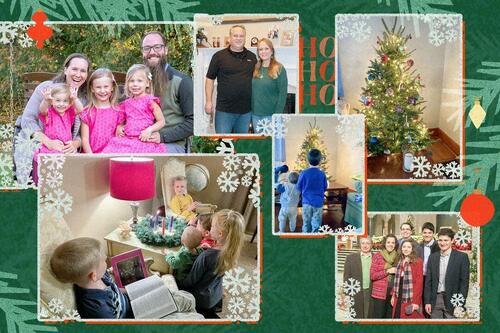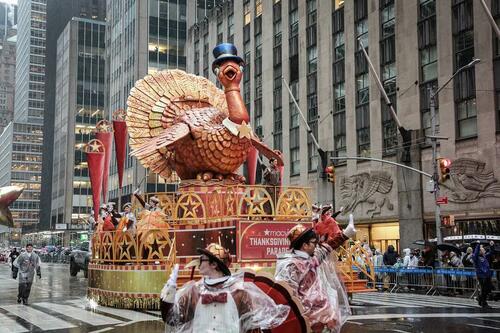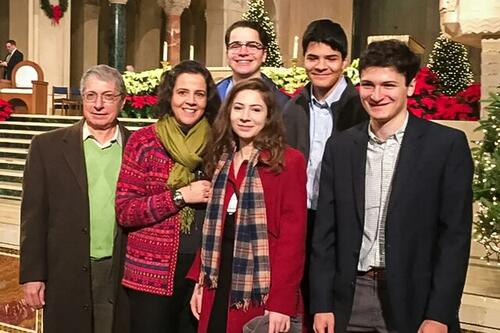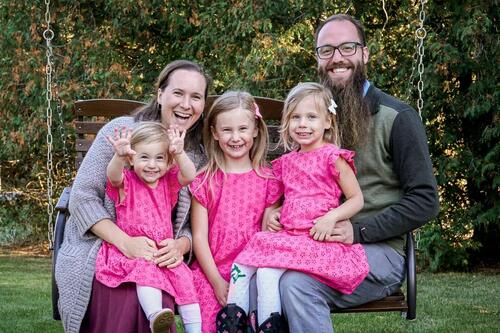
American Families Find Joy In Simple, Traditional Christmas Celebrations
Authored by Lawrence Wilson via The Epoch Times (emphasis ours),
Every year, it got more intense. The advertisements started earlier and earlier. The lawn decorations became bigger and brighter. And the consumerism—the craving, spending, and debt—got to be too much.
Family time seemed to be slipping away. It wasn’t what parents wanted for themselves and their children. Something had to change.
 Illustration by The Epoch Times, Shutterstock, Courtesy Carla Gonyo, Courtesy Kathleen Birch, Courtesy Sherry Binversie, Courtesy Rebecca Teti
Illustration by The Epoch Times, Shutterstock, Courtesy Carla Gonyo, Courtesy Kathleen Birch, Courtesy Sherry Binversie, Courtesy Rebecca TetiThat version of the Christmas story is familiar to many Americans who have grown weary of the many social and financial obligations attached to the holiday season.
The sentiment is humorously expressed in a social media meme: “The War on Christmas cannot end until Christmas stops its illegal occupation of November. I am calling on the Claus regime to return to the borders agreed upon in the Black Friday Agreement.”
Yet the ever-growing demands of the holiday season can exact a toll on financial and emotional well-being.
More than two in five U.S. adults report feeling stressed during the holidays, according to the American Psychological Association. More than a third say the holidays feel like a competition.
Some 28 percent of Americans who charged 2023’s holiday gifts on a credit card still owe some of the balance, according to a survey conducted by The Harris Poll for NerdWallet.
Amid the crush of holiday obligations, we found some families who have found ways to pare the expectations back and create meaningful, joy-filled Christmas celebrations.
While they were quick to point out that they’re not down on the Christmas season itself, they valued taking control of their calendar, setting financial boundaries, and focusing more on religious traditions.
Anticipation
The holiday season has been growing longer since 1939, when President Franklin D. Roosevelt set the date of Thanksgiving as the fourth Thursday in November. Thanksgiving had been celebrated on the last Thursday of the month, which fell on Nov. 30 that year.
Concerned that the shortened shopping season would dampen the country’s recovery from the Great Depression, Roosevelt moved Thanksgiving up a week. Congress made the change permanent in 1941.
 An estimated 3 million people turned out in inclement weather to watch the Macy’s Thanksgiving Parade in New York City on Nov. 28, 2024. Richard Moore/The Epoch Times
An estimated 3 million people turned out in inclement weather to watch the Macy’s Thanksgiving Parade in New York City on Nov. 28, 2024. Richard Moore/The Epoch TimesThus began Black Friday and what would later be called “Christmas creep,” the gradual lengthening of the holiday season. Christmas advertising and store decorations are now seen routinely in October.
A common theme among families who have retooled their holiday practices is to delay celebrating Christmas until much closer to the day itself. For many, that involves Advent, the four weeks leading up to Christmas observed by Roman Catholics and many Protestants. The purpose is to cultivate one’s spiritual life in anticipation of the celebration of Jesus’s birth.
For Rebecca Teti, 56, of Hyattsville, Maryland, Advent is a way of pushing back against the ever-increasing social and financial expectations of the holiday season.
Raised in a mixed Jewish and evangelical Christian home that celebrated the cultural symbols of the season, Teti converted to Catholicism as an adult. She and her husband, Dennis, reached a turning point after celebrating their oldest child’s first Christmas with the extended family.
“We went over to the grandparents’ house, and here’s this poor little toddler who’d be perfectly happy playing with a tube of cardboard, and he had to keep opening presents. It was just way too much,” Teti said.
Teti and her husband began the practice of Advent with their children. Though the kids are now grown, the couple still spends the four weeks before Christmas in prayer and reflection rather than partying and decorating.
“We don’t do parties, we don’t do lights, we don’t do decorations until much closer to Christmas,” Teti said. “If I do let myself get caught up in preparation, preparation, preparation, it kind of spoils the celebration.”
 Dennis (L) and Rebecca Teti with their children at the National Shrine of the Immaculate Conception in Washington on Jan. 1, 2018. Courtesy of Rebecca Teti
Dennis (L) and Rebecca Teti with their children at the National Shrine of the Immaculate Conception in Washington on Jan. 1, 2018. Courtesy of Rebecca TetiDelayed gratification is difficult for our culture to accept, according to Tracy Hilts, pastor of Living Hope Church in Colorado Springs, Colorado.
“Advent requires an intentionality that does not come naturally to our Western mindset,” Hilts wrote in an article for the Evangelical Covenant Church website.
Yet the waiting is part of the joy for those with whom we spoke.
Sherry and Nathaniel Binversie of Fort Wayne, Indiana, heighten the anticipation of Christmas by placing an Advent wreath and candles on their dining room table.
An Advent wreath commonly contains four candles, lit one by one over the four weeks of the Advent season.
“We light the candles at every meal,” Sherry Binversie, 32, told The Epoch Times. “We’re marking the time as the light of Christ is coming.”
The Teti and Binversie families also wait until Epiphany to exchange gifts with their immediate families. That holiday, which falls on Jan. 6, marks the visit of the three wise men, or Magi, bringing gifts to Jesus. It is the day after the traditional 12 Days of Christmas, which symbolize the journey of the Magi.
“That has worked really well for us because it makes Christmas morning less about gifts and more about the joy of Christ’s coming and being able to be with family,” Teti said.
Part of the fun for the children was being able to eat whatever they chose from Christmas through New Year’s Day. Ice cream on a Monday? Sure, it’s Christmas!
 Nathaniel and Sherry Binversie of Fort Wayne, Ind., with their children in 2004. Courtesy of Sherry Binversie
Nathaniel and Sherry Binversie of Fort Wayne, Ind., with their children in 2004. Courtesy of Sherry BinversieFaith
The overwhelming majority of Americans, 91 percent, celebrate Christmas. That includes 82 percent of those with no religious affiliation and 74 percent of adherents to other religions. That’s according to Lifeway Research, an evangelical research firm associated with the Southern Baptist Convention.
While most are aware that Christmas celebrates the birth of Jesus Christ, fewer than half attend a church service during the holiday season.
For the families we spoke with, Christmas becomes more meaningful and enjoyable when they focus on the spiritual meaning. That involves some traditional religious practices. While that typically includes attending a church service on Christmas Eve or Christmas Day, most of their religious traditions take place at home and involve the entire family.
Kathleen and Vincent Birch of Fort Wayne, Indiana, use an Advent calendar to count down the days until Christmas with their oldest child. An Advent calendar features a set of numbered windows or drawers that conceal a treat or other object.
Read the rest here…
Tyler Durden
Tue, 12/24/2024 – 22:00

 7 miesięcy temu
7 miesięcy temu











